ANSMET team • Jan 26, 2009
The Antarctic search for meteorites: snow ends the season
January 19-26, 2009
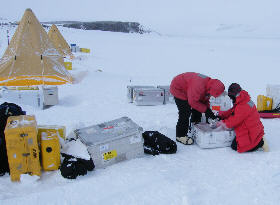
Joe and Amy inventory the meteorites and pack them for shipment to Houston.
ANSMETMother Nature throws a season-ending curve
January 19, 2009
You have heard us before complaining about how Mother Nature has treated us badly. Well today she outdid herself.
I ended yesterday's blog with the hopeful note that we were just 11 meteorites shy of the 500 meteorite mark, and that I felt confident we could make it. Now, I know that that is just an artificial mark of no greater significance than say 489 or 513. But human nature is to strive toward goals that are nice round numbers. Nobody tries to win the Indy 487, after all. We expected to have two working days to break the barrier, which seemed a cinch. Then, overnight, disaster hit.
Last night the winds were very light, so it seemed as though we would go out and work today. But when we got up, the skies were overcast, a light breeze was coming out of the north, and it was snowing. By noon, enough snow had fallen that many of the smaller meteorites would be invisible to us. It doesn't take much snow. Many of the meteorites occupy small wind scoops on the ice, and these rapidly fill in with even a light snow fall.
In mid afternoon the winds shifted and were coming out of the southeast, but were not strong enough to move the snow. As I type now at 23:00, the snow is still covering the ice. It seems highly unlikely that we will get winds overnight strong enough to clear the new snow, and that they will calm down enough in the morning to allow us to go out and harvest more meteorites. Antarctic weather just does not work that way. Tomorrow (Tuesday) would have been our last working day.
Starting Wednesday at the latest, we have to prepare the camp for possible pull-out to McMurdo. We are alternates for flights on Wednesday and Thursday. If the Basler cannot land at its primary target on those days, it will come here and get us, weather permitting. We are the primary target for Friday and Saturday flights.
Recognizing that the season was most likely over, we began organizing the camp for the pull-out. Meteorite flags were collected from the ice field and bundled up to be used in future years. Our remaining food was collected and organized into a central location. The meteorites were inventoried and locked into the containers that will be shipped to Houston. Gear was hauled out to the skiway. It is always sad when a season ends and preparations for pull-out begin, but it is doubly so when the season ends prematurely.
100 years ago this date: Shackleton and his team traveled down hill with the wind at their backs. Even though they had to descend ice falls and cross crevasses, they covered 29 miles of snow and ice. They are now only about eight and a half miles from their next depot of food.
Cheers,
LYAN
duck
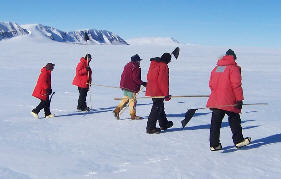
Amy, Joe, Johnny, Duck and Deon cruise for meteorites
ANSMET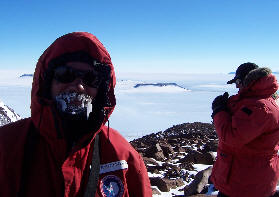
Duck's beardsicles reach grand proportions; Deon photographs the amazing view from Mt. Ward.
ANSMET521
January 20, 2009
Antarctica has smiled on us once again; we woke to clear skies and not a breath of wind. Unfortunately, our systematic search area was largely covered in new snow (giving me memories of the Miller Range 05-06!) but we did a moraine foot search this afternoon and found 32 more meteorites, bumping us over the 500 mark for the season. Our final days have been full of surprises.
As Scott's journey took him and his companions closer to their goal of the South Pole in early 1912, he at times waxed sentimental about the qualities of his traveling companions. He recounted how each of them brought a special set of indispensable skills to the party, and that he couldn't imagine having left one of them behind. (As we read on about their journey, we are finding that doing just that may have saved them all, ironically.) Similarly, as we are nearing the end of our journey and imminent separation, my thoughts are mostly of my companions and their abilities. Below is a list of some of our most endearing qualities that may help you understand why Johnny didn't leave any of us in McMurdo.
Amy - Has the uncanny ability to walk into a moraine, where three others have searched before her, and find five meteorites. Is able to lie on her stomach on the ice for a large part of the day, taking meteorite photographs. Can also carry 1/2 her weight in coat.
Deon - Readily locates and probes crevasses (mostly little, harmless ones). Has managed to shave more frequently than the girls have washed their hair, by a factor of 3. Can tell you the world is coming to an end in such a disarming way that you believe him and are ok with it.
Duck - Is never EVER cold. Grows Johnny-rivaling explorer beardsickles. Knows his meteorites. Also has a certain Zen air about him and never gets ruffled.
Joe - Can keep his bare hand out during the majority of a meteorite collection. Has a personal story about every spacecraft mission from the last 30 years. Has random wittisms. Sampler 1: (during meteorite collection) "This is like the Rocky Horror Show." (We have no idea...)
Me (Jani) - Is able to McGyver her way through much (yes, Deon's stabilicer is finally fixed, for now). Can also eat a meat stick while riding a skidoo, wearing gloves and a gaiter, and has done so frequently.
Johnny - All skills, all knowledge are his. Is able to herd cats. Has infinite patience. Can come up with a one-liner suitable for every occasion. Sampler 1: "That's why we keep the can of bear grease over here." Sampler 2: (in response to Joe's question, I always sleep more on tent days, why is that?) "Well, you know, guys on death row sleep like 16 hours a day."
It turns out we did have to leave one of our companions behind - Ralph. This was mainly due to timing (and, perhaps, to tent space and especially rations...). But, like Shackleton, he is a member of our team, so his main qualities are below.
Ralph - Can eat an omelet the size of a cat. Maneuvers through McMurdo scheduling like skiing the World Cup giant slalom. Knows his peeps, their loves, their wants, their capacities, like no other.
I'm also lately growing a bit sentimental about our lovely Davis-Ward area. Views of giant, black boulders tumbled from Davis Nunatak onto blue ice seen from the notch in the dike, the field of flags littering the rippled moraine embraced by the looming Mount Ward, and the copper-colored glaciers tumbling from the impossibly distant Supporter's Range are each so breathtaking and almost too much to absorb. We will miss this place. I close with a haiku composed while skidooing home toward the sun.
ANSMET haiku:
Newly freed ice gems
Sparkle, tinkle, race downwind
White dances on blue
100 years ago this date: Shackleton and his explorers push on toward safety. They were going down hill across crevassed areas. The winds were blowing the sledge sideways and they had many falls. Going down the steepest slope they had to slowly lower the sledge and had trouble controlling it.
-- Jani
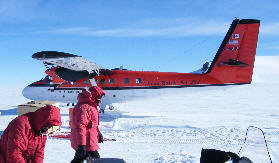
The Twin Otter, loaded with our no-longer-needed items, readies to take off for the Pole.
ANSMETThe end draws near
January 21, 2009
Well, we are very nearly at the end of our stay in the field...in theory.
Today a Pole-bound Twin Otter stopped by and picked up a bunch of "retro" (waste, recyclables, and reusables) and some gear that we no longer need. Once at the Pole, it will get boxed up and sent to McMurdo where we will properly take care of all of those items once we arrive.
Tomorrow we are an alternate mission for the Basler, and primary on Friday and Saturday. Now that the Twin Otter has taken a substantial fraction of our stuff, we expect that only two Basler flights will be needed to get us out of the field. We will be on the second. With good weather, we should be in McMurdo no later than Saturday. With good luck, we might make it on Friday. With bad luck, who knows?
John and I have been in the field six weeks. I, at least, am looking forward to a long, long hot shower. I may stay in it a week.
We on the ANSMET team wish President Barack Obama and First Lady Michelle Obama well as they start his historic presidency.
100 years ago this date: Like us, Shackleton and his men are trying to get back to Ross Island. Unlike us, they spent their day man-hauling their sledge down hill with the wind at their backs. Shackleton is injured from several falls of the day before and could not pull the sledge. Their progress was 17 miles.
Cheers,
LYAN
duck
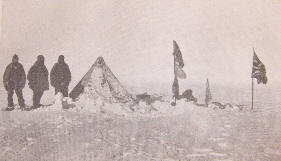
Shackleton's expedition
Shackleton and two of his men photographed at their southernmost location. Modified from "The Heart of the Antarctic" by Sir Ernest Shackleton, Carroll & Graf Publishers, Inc.ANSMET
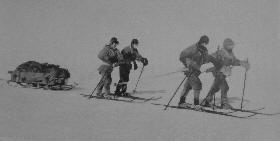
Scott's expedition
Scott's party on the Polar Plateau. Modified from "Tragedy and Triumph" by Captain Robert F. Scott, Konecky & Konecky.ANSMET
Reflections
22 Jan. 2009
As we close out the 2008-2009 ANSMET field season it is worth reflecting on our experience and that of our predecessors, Sir Ernest Shackleton, Captain Robert Falcon Scott, and the men of the Heroic Age of Antarctic exploration. We have been reading the diary entries for the days that we have been in the field and living with them through those words. But unlike those who sit in the comfort of an easy chair by the fire reading these journals, we are experiencing the same landscape, the same blizzards, the same cold that these hardy explorers were experiencing only 100 years ago. And that gives us a deeper appreciation and understanding of the amazing journeys those men undertook.
For we did not have to daily harness ourselves to a sledge and plod on over the endless ice to get here, struggling to our last ounce of strength. The aircraft technologies that we have to get us where we are would have seemed like an alien spaceship to those men. We have a surfeit of chocolate, cheese, meat (no horse meat here), and other foods that those men dreamed of and would have sold their souls for. Our snowmobiles take us over the ice and haul our gear with little effort. And our equipment and clothing has allowed us to work effectively in this harsh environment with only minor discomfort compared to the continual challenges that faced Shackleton and Scott’s men.
In reading the early accounts we have realized just how far out on the proverbial limb those men were. They were constantly on the edge of disaster and in Scott’s case it did end in tragedy as events proved. Consider that Shackleton and his three companions are 800 miles from the nearest humans, no communications, only depending on razor thin provisions, judgment, and luck. They must traverse that distance back to safety on foot. No one knows where they are. There is no one to help. If we have a problem, we only have to call McMurdo and a plane is on its way. (No Joe, we can’t call an airplane because you have a tiny split on your finger). Shackleton and Scott might as well been on the far side of the Moon. We have continually been amazed at those explorers as we try to compare them to us. And we always come up wanting. Those men are of a different age and of a different mind, and they seem to appear superhuman to us.
It seems like 100 years is a long time ago. So much “progress” and so many significant events in human history have occurred in those hundred years that it does seem distant. But survivors of the Heroic Age were still alive during my lifetime and had I been fortunate enough, I might have been able to meet them. But in context of the meteorites that we have been collecting, this brief period of human history is only the merest flash of time in the history of our solar system, which was birthed 4.65 billion (that’s 465,000,000,000) years ago. And here we are in Antarctica gazing upon the fragments of that cataclysmic time. We have collected 521 specimens of that early time here at Davis Nunataks-Mt. Ward Icefield so as to better understand our place in the universe. And just like our existence here amidst this vast inhospitable landscape of indescribable beauty, in which we are so privileged to be, we are so insignificant.
100 years ago this date: Shackleton and his men traversed crevassed ice slopes. Shackleton still is not well enough to help pull, and another man had to act as guide and was not harnessed either. Even so, they made 15 miles of northward progress.
John
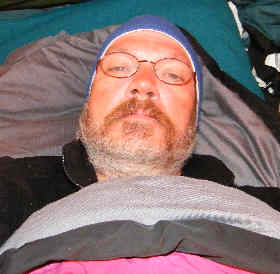
A tent slug: self-portrait.
ANSMETThe fine art of being a tent slug
January 23, 2009
Last night John got the disappointing news that we had been bumped from the primary to the alternate mission for today. It turned out not to matter. In the morning we were in white-out conditions, and a plane could not have landed anyway. The temperature was -21 C (-5 F) and John estimated the wind speed at 65-70 kph (40-45 mph), putting the wind chill temperature at roughly -50 C (-60 F). Not a pleasant day. Quite a contrast from earlier in the week when we had no wind and a warm day.
We have absolutely nothing to do except wait for our ride to McMurdo. We have become tent slugs. Herewith, a day in the life of a tent slug.
06:50: Wake up when John's alarm goes off. Go back to sleep.
08:00: Wake up when my alarm goes off. Go back to sleep.
09:45: Wake up for good.
09:45-11:30: Stay in the sleeping bag hoping the winds will die down.
11:30: Get out of the sack and go outside for necessary "business." Hard to stand in the wind while taking care of "business."
11:35: Vow never to do that again.
11:45: Listen to Pole-bound plane go overhead. Fantasize about being on that plane.
12:00; Make breakfast, lunch, whatever it is. Yum. Lunch meat on Rye Krisps. The breakfast of champions.
12:15-14:00 Have coffee. Work on cryptograms and update daily journal.
14:00: Have more coffee. Continue working on cryptograms:
14:45: Get back into the sleeping bag.
14:45-16:15: Stare at the tent walls. Consider desperate measures to get plane to come pick us up. Who might be willing to take one for the team?
16:15: Go outside again to take care of "business" and chip ice for water. Man, I've really got to stop doing that! Consider bringing a two-months supply of "astronaut diapers" the next time I come down.
16:30-18:00: Have Hot Cocoa and work on cryptograms.
18:00: Time to make supper. Yum, yum.
18:35: Go outside to take care of "business." Hey, not so bad this time. The winds have decreased. There is no more blowing snow. The sun is visible.
18:40-20:00: Have more hot cocoa. Work on blog.
20:00-21:10 The team mates gather for the daily reading of Shackleton's and Scott's expedition journals. Oh boy! Amy brought chocolate! Discuss our bleak future. General kibitzing.
21:10: go outside. More "business" to take care of. Not too bad; didn't put on the wind pants this time.
21:15-21:30: Post blog.
21:30-23:45: Get back in sleeping bag. Read.
23:45: Go outside to take care of "business" one last time for the day.
24:00: Turn in for the night. Prepare to do it all over again tomorrow.
ANSMET haiku
We are just tent slugs
We have nothing more to do
Take us Basler, please
100 years ago this date: Shackleton's daily entry was very short with little information. Shackleton must still have been suffering from his falls of a few days before.
Cheers,
LYAN
duck
Trapped
January 24, 2009
Here we are. Still in the field. Trapped. By bad weather and low priority.
We keep getting bumped from primary to alternate mission by the Long Duration Balloon experiment. A curse be on them and all their progeny. The National Science Foundation has decreed that they are a priority for flights. Only if the weather is bad for them, or they get all their equipment out, will we manage to get a flight. The weather has been bad for them. Unfortunately, the weather has been bad here, too. They remain top dog. We remain stuck in limbo.
Today the surface was completely obscured in the morning when it came time to call in the weather. Sometime after 09:00 it cleared. Our first indication of this was when we heard a Twin Otter bound for McMurdo pass overhead about 10:15. John and I got out of our sleeping bags and into our gear in record time. The Twin Otter had landed and the pilots were in the process of refueling when John and I ski-dooed up to the plane. We helped them load some gear and the ski-doo to take back to McMurdo. I begged and pleaded but they would not take me. John grabbed onto one ski and would not let go. The pilots finally pried him loose and stuffed him in the big box of garbage we have waiting for transport. Then they took off.
Tomorrow (Sunday) there are no flights. We are alternates again on Monday. I'm going to work all the mojo I can think of to try to get us out of here on Monday. We may be the first ANSMET winter-over team.
100 years ago this date: Shackleton's team man-hauled for a long day and made 16 miles. Their sledge is breaking down due to wear. They have 40 miles to go till their next depot, but they are short on rations.
Cheers,
LYAN
duck
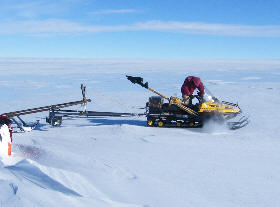
John gets the groomer ready to smooth out a few wrinkles in the skiway.
ANSMETSunday, with nowhere to go
January 25, 2009
As we have mentioned before, Sunday is a no-fly day here in Antarctica. This means the only thing we have to do is call in to McMurdo Operations and let them know we are still alive. As though they care! John took care of that at 07:30. That left the team with 23 hours and 58 minutes to kill for the day. Sigh.
It was a beautiful day here. Moderate winds, scattered high cirrus clouds, unlimited visibility. In short, a perfect day for a plane to land. Sigh.
I have great hopes for tomorrow. I am sure my wife is putting some serious evil mojo on the Long Duration Balloon (LDB) experiment folks. They are going to have such foul weather tomorrow that I almost feel sorry for them. Good luck finding your tents again guys!
We, in contrast, will have a beautiful day for a pull-out, just like today. I am so confident that we will get extracted that I reorganized my personal gear so I can grab it and go within 60 seconds. I also practiced my emergency “hop aboard” drill several times. If a plane so much as flies low over camp with a window open I’ll be aboard before the pilots know what happened.
John was a bit more practical. He checked out the skiway to make sure it is still in good shape. He then went out to tidy it up a bit to make it very sexy for the Basler pilots. It is now as smooth as a baby's bottom, but without the crack down the middle. I’m sure our skiway is far, far superior to anything the LDB folks have to offer.
Amy and Joe decided to go out where there are some interesting weathering profiles developed in soils that have formed on Ferrar dolerite. Avid readers of this blog will remember that Amy did her dissertation research on the weathering of Ferrar as a Mars analog. Ferrar dirt is in her blood.
Deon and Jani? I do not know what they did today. Maybe they were tent slugs.
ANSMET haiku
Still at Davis-Ward.
Basler pilots come take us!
We have two women!
100 years ago this date: Shackleton and his men had a long day. The weather was fine, but at the end they were crossing dangerous crevasses. They made 26 miles. Their food is almost out, but they are within sight of their next depot.
Cheers,
LYAN
duck
The plane...The plane!
January 26, 2009
My wife worked her serious mojo last night. Thank you Nurit!
I woke up just before 07:00 and heard John pass weather to McMurdo. It was a GOOD weather report. I was still awake at 07:30 when he called to check in with MacOps. I could tell from the timbre and pitch of his voice that the news was good.
No Basler for LDB today. They are coming to Davis-Ward to save ANSMET!
Barring changing weather and mechanical troubles, we could be sleeping indoors tonight, after taking a long, hot showers. Nurit, keep that mojo working!
Time to start packing gear.
ANSMET haiku:
The weather is good.
ANSMET is ready to go.
Come Basler, hurry.
Cheers,
LYAN
duck
Support our core enterprises
Your support powers our mission to explore worlds, find life, and defend Earth. You make all the difference when you make a gift. Give today!
Donate

 Explore Worlds
Explore Worlds Find Life
Find Life Defend Earth
Defend Earth

